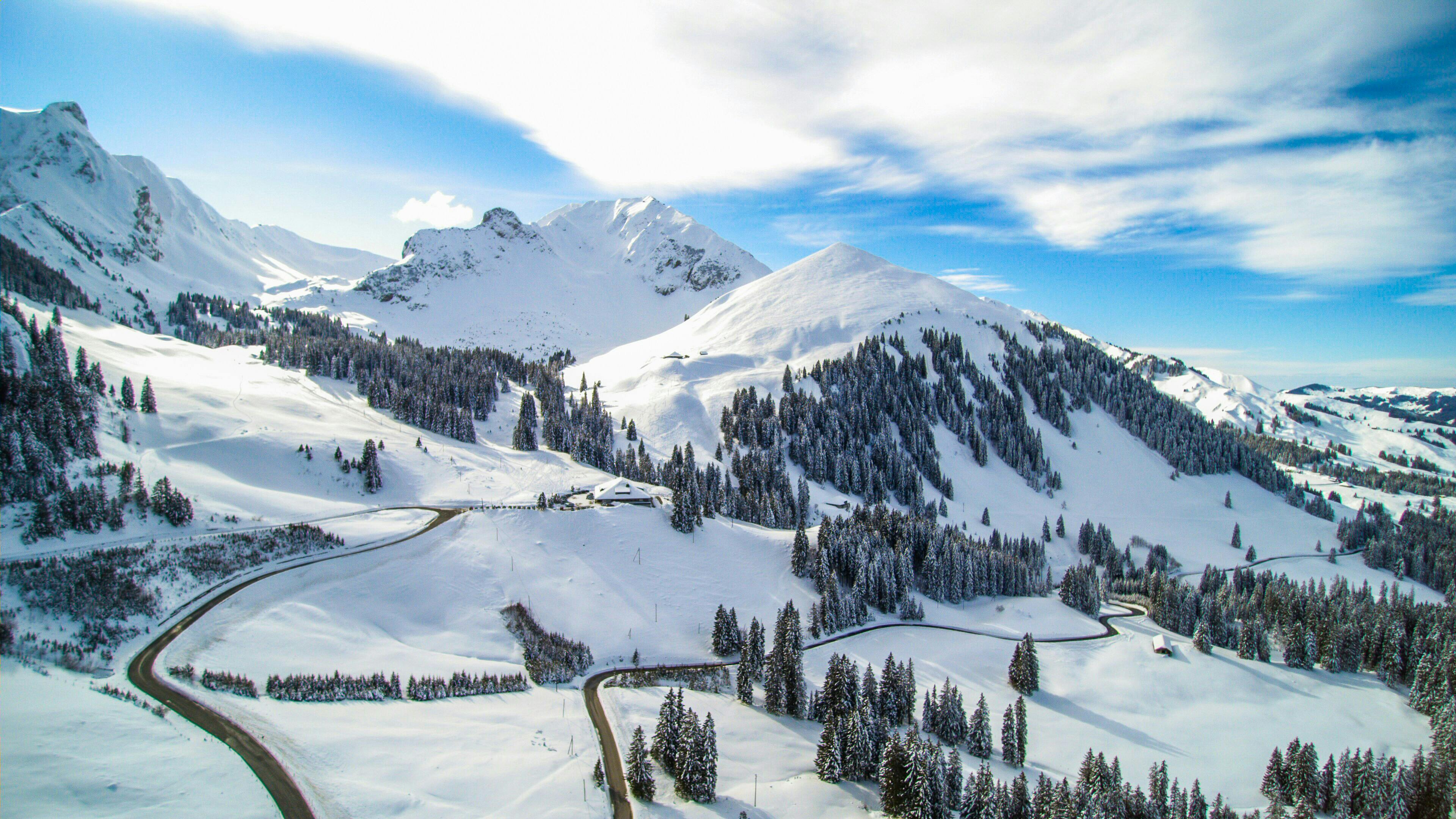- Ski.com Home
- Blog
- Skiing Chamonix’s Vallée Blanche
Skiing Chamonix’s Vallée Blanche

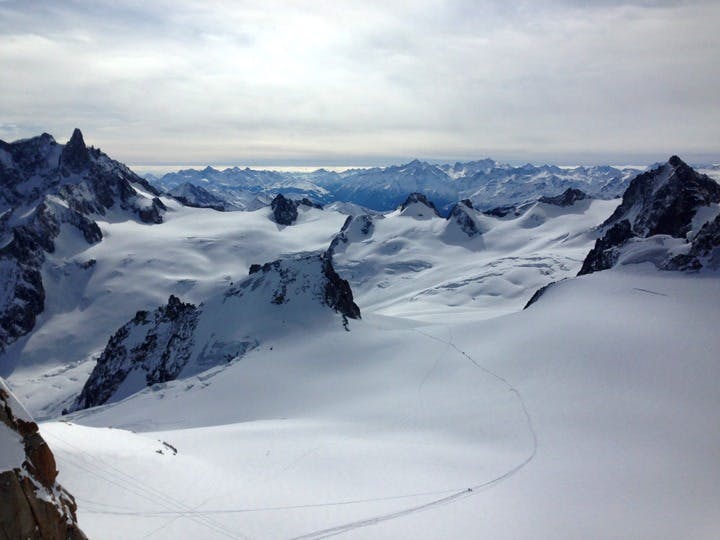 Ski tracks following the Vallée Blanche Classic Route
Ski tracks following the Vallée Blanche Classic RouteRegarded as one of the most iconic off-piste descents in the Alps, the Vallée Blanche is a 20-kilometer tour across an expansive glacier surrounded by truly spectacular Alpine scenery. On a trip to the Chamonix Valley a few years ago, we skied the famed valley on a bluebird day with more than two feet of new snow. Here's an account of our experience with some pieces of advice about skiing the Vallée Blanche.
From town to 12,602 feet
We met our guide from the Mont Blanc Ski & Guide Compagnie at the base of the Aiguille du Midi cable car. After strapping on our avalanche beacons and securing our harnesses (both required for travel on the glacier), we rode up two trams, ascending 9,200 vertical feet (2,800 meters) to the spired station carved into the mountain rock.
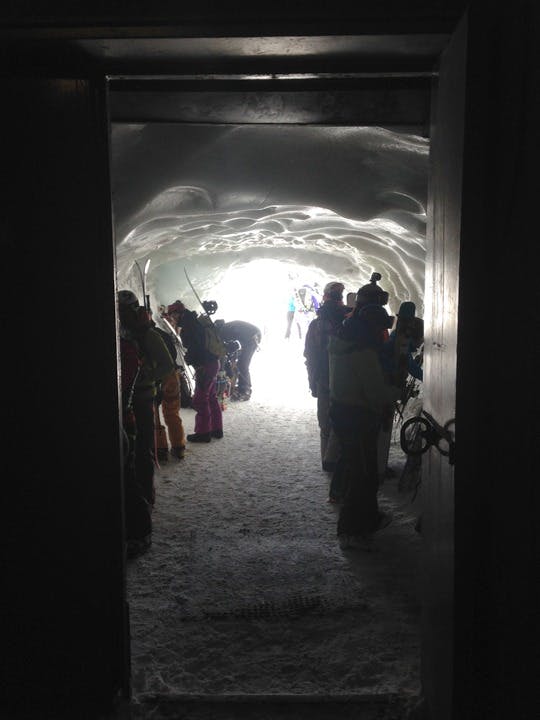
This station is a gateway for all types of Alpine adventurers, from skiers and snowboarders to ice-climbers and mountaineers. Mont Blanc, Europe's tallest mountain, towers just to the right, and when the snowpack is deep enough, extreme skiers repel off the footbridge into the Cunningham Couloir. Avoiding the repel option, we attached ours skis to backpacks, were roped together (and to our guide), and meandered out through the caves to the first part of the on-snow descent.
Side note: Even if you’re not skiing, it’s worth the trip to the top to see the station, which is an incredible feat of engineering in itself. The 360-degree views of the Alps are spectacular and stretch to Italy and Switzerland with the Matterhorn visible on clear days. There are informational installations about Chamonix’s mountaineering history and current climbing and skiing activities. The new Skywalk, a glass room built into a metal frame, gives visitors a thrill with a view of 1,035 meters of emptiness below.
The notorious hike down
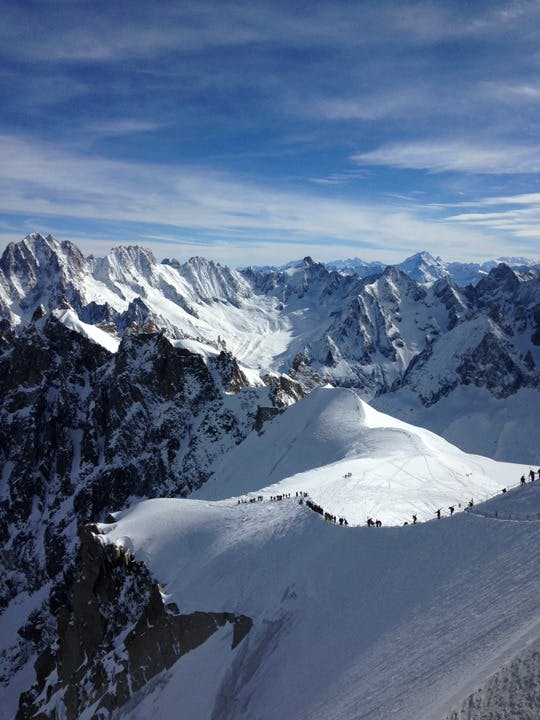 Skiers hike down the narrow ridge to the start of the Vallée Blanche tour
Skiers hike down the narrow ridge to the start of the Vallée Blanche tourThe first descent requires walking down a narrow ridge for about 100 meters, and many make this out to be the most challenging part of the experience. While it can be a bit hairy in icy or windy conditions and during the early season when the rope might not be installed yet, we found it to be very straightforward. The only challenge was staying focused on our feet when the views were so distracting!
Skiing the Vallée Blanche
There are several routes skiers can take through the Vallee Blanche, and they vary from the intermediate-friendly Classic route to the expert-only Grand Envers du Plan. Our group was made up of expert skiers, so we took the Envers du Plan route, just to skier’s right of the most difficult track.
To put it lightly, we scored amazing conditions. The tram had been closed for a few stormy days, and we showed up to knee-deep, untouched powder. While we still had to heed our guide’s instructions to avoid crevasses and navigate sturdy but a bit unnerving snow bridges, most of the time we were arching creamy turns across pristine, steep faces.
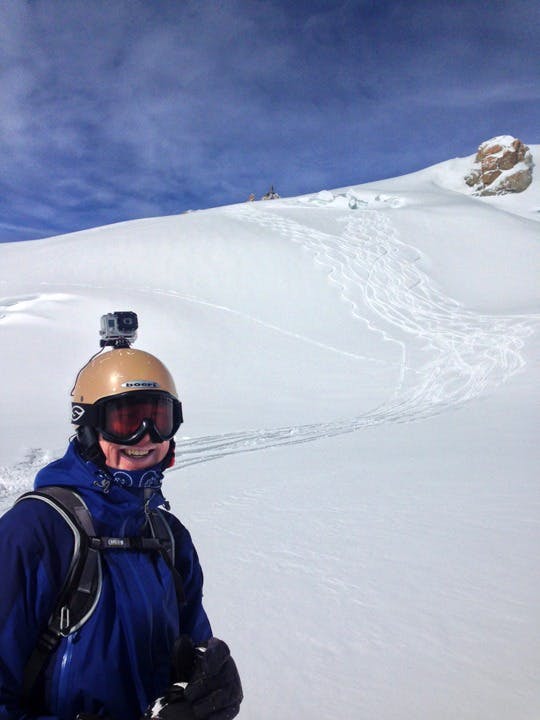
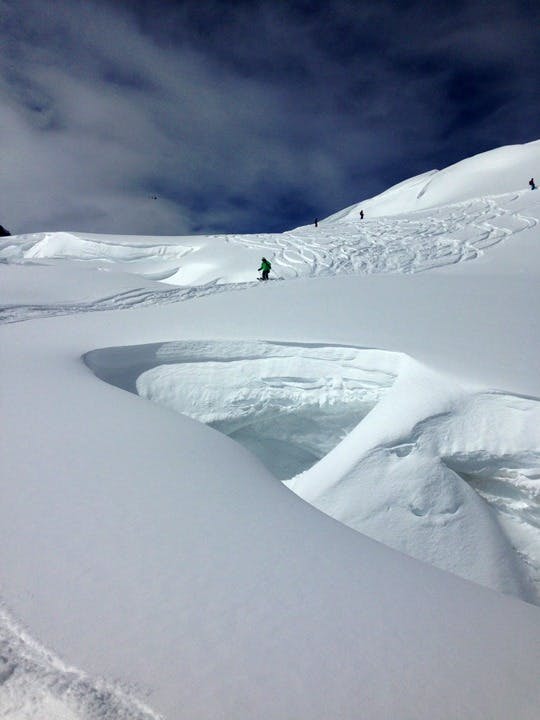

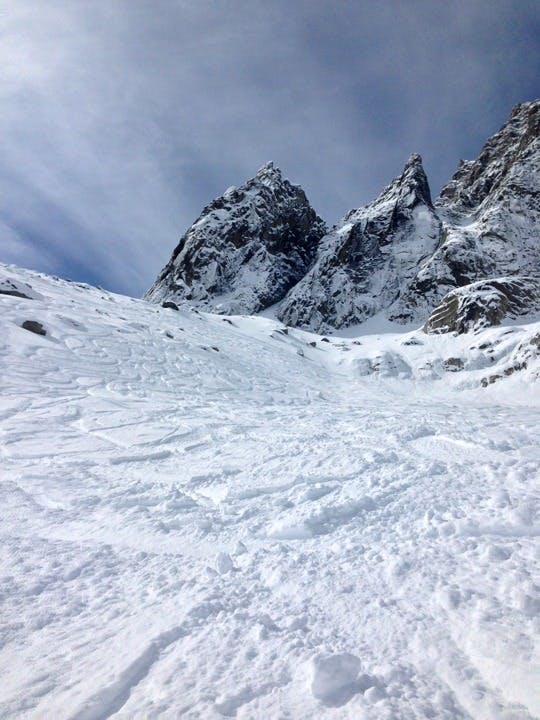
We reached the glacier flats with some serious leg burn, snapped a few #catskiing photos and skated across the run-out.
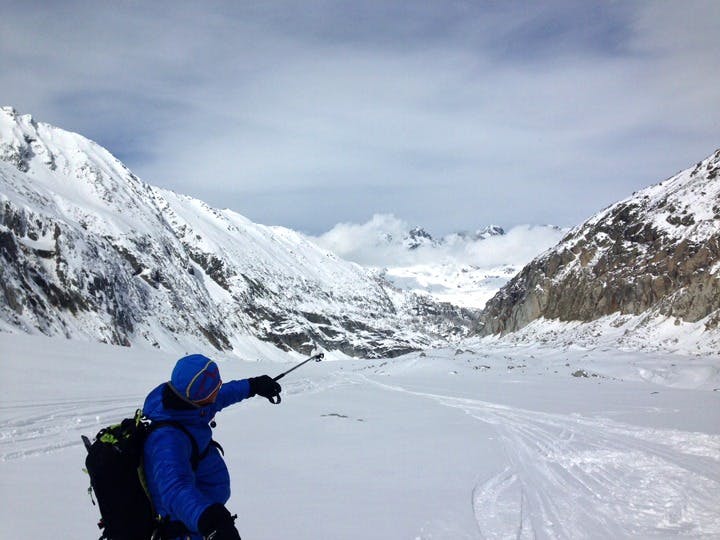
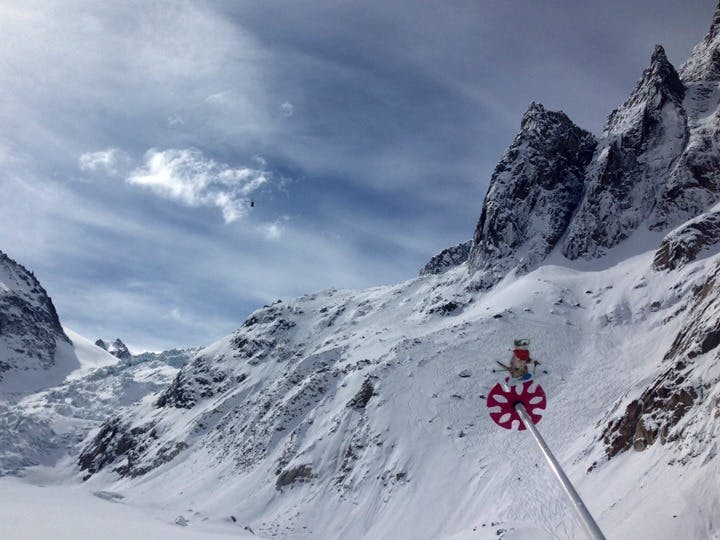
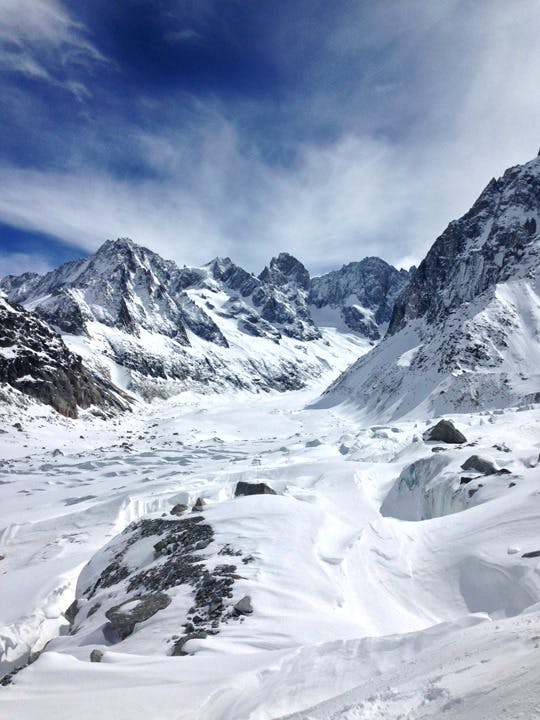
The run-out: Montenvers train vs. the James Bond Trail
At the bottom of the Mer de Glace, our guide posed a question to the group: take the normal way back – a hike up 400 stairs to board the Montenvers train that descends the mountain – or ski all the way to town on the “James Bond Trail.” With a name like that, how could we resist? Thanks to the recent storm, there was a just enough snow to meander through the valley, hike up a short pitch and dodge dirt patches on the final switchbacks into the valley.
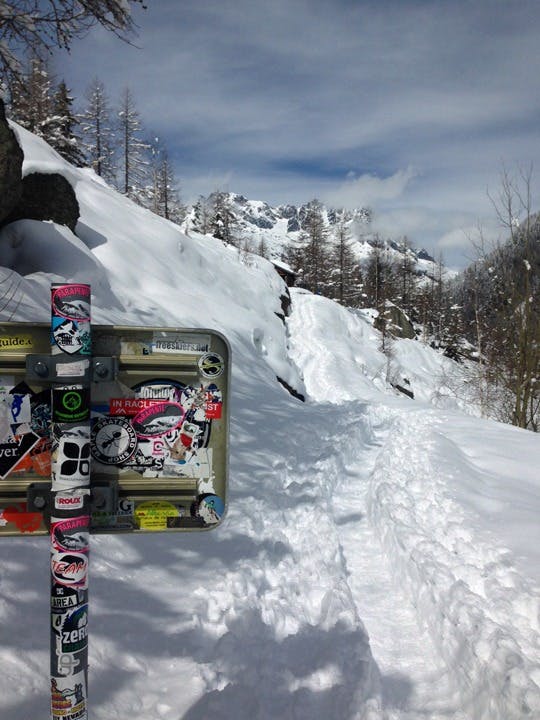
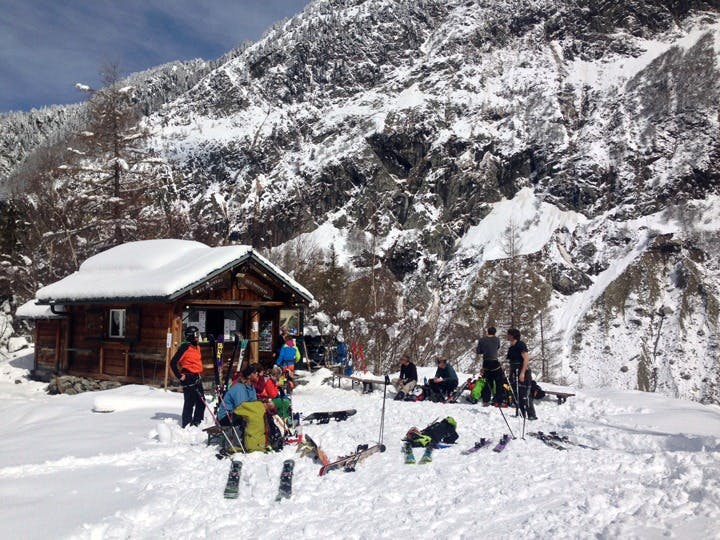
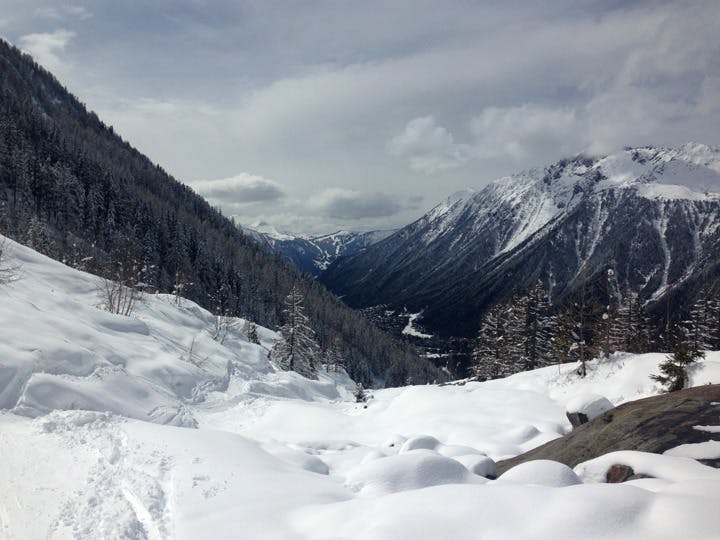
When to go
The Vallée Blanche can be skied from December through May, but conditions typically are best in March and early April. At the beginning and the end of the season, the experience takes on a more “Alpine character” – ropes may not be installed on the first walking descent during the early season, and the glacier can be more exposed with delicate snow bridges when the snowpack is lower. If you’re in Chamonix for a few days, make plans to do the Vallée Blanche on a sunny day. The weather is a limiting factor, but if conditions align, it’s truly a spectacular experience.
What you should know before skiing the Vallée Blanche
Hire a guide – It’s really not worth unwittingly stopping on a snow bridge or falling into a crevasse. The glacier changes constantly, and mountain guides know the snow like a rafting guide knows the river, using cues in the terrain to foresee dangers. Also, talk to your guide about the best route for the day's conditions and for your skiing ability. The Classic Route is beautiful and appropriate for intermediate skiers if the weather and conditions are good, but if you’re looking for something more challenging, express your ability clearly. The Mont Blanc Ski & Guide Compagnie is the oldest and most renowned in the valley, and they offer private and group Vallée Blanche excursions.
Check the weather – This is the determining factor in deciding if your excursion is a “go” or a “no go.” Your guide will make the call, but the Chamonix app has excellent short-range forecasts that account for different conditions at the vastly different elevations.
Start early – Snow conditions change quickly in the Alps, and the journey can take four to five hours. If the weather turns bad, the experience can become a lot more exciting, which is not always a good thing.
Overdress – The top of the tram is more than 9,000 feet higher than the base, and the weather and temperatures can be dramatically different. If it’s a warm, spring day, you’ll be shedding layers when you get to the bottom, but it’s better to be hot than hypothermic and delirious.
How to get there
This part is easy: Ski.com has a team of Mountain Travel Experts who specialize in European ski resorts. They can plan your Chamonix ski vacation including a guided tour of the Vallée Blanche. If you'd like to experience the French Alps this spring, summer, or next winter. Get a free quote to get started.
TAGGED: aiguille du midi, Chamonix, glacier skiing, off piste, aspen ski area, snowboard slopestyle, Vallee Blanche
Alex Boyd
Author
How Our Free White (Ski) Glove Service Works:
Reach out to a Ski.com Mountain Travel Expert by phone, chat, or our online form. Share details about your group size, interests, and budget and your Expert will begin to craft your dream ski vacation.
Get a curated proposal with personalized suggestions from your Expert via email. Book directly online or request additions or revisions from your Expert until it’s perfect.
If you have questions, want to add or modify your reservations or need anything assistance, your Expert is always by your side to help before, during and after your trip.
Sign up for our newsletter
Sign up for exclusive offers, news, updates and more.

